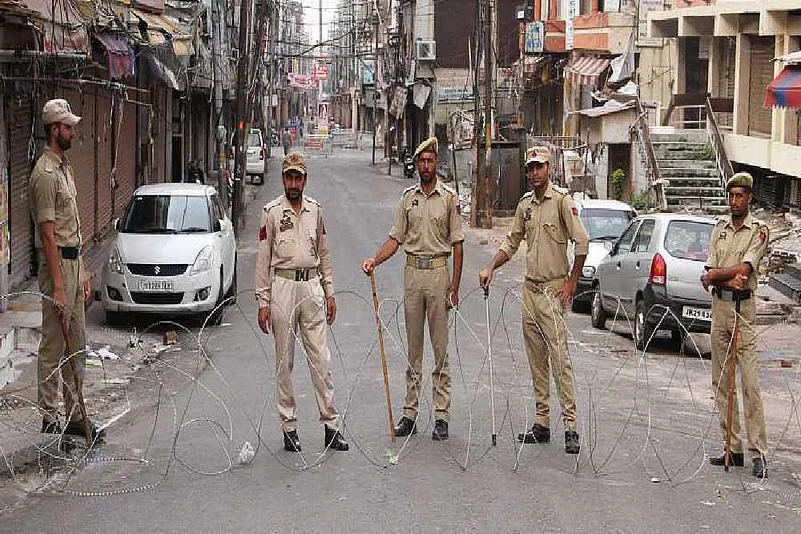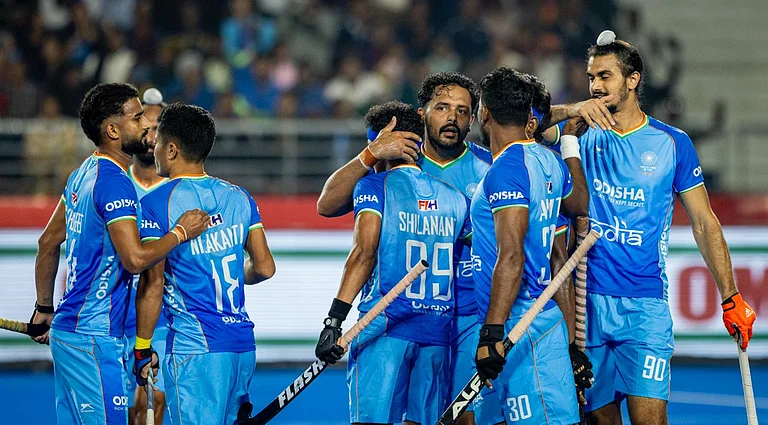The situation in all three regions of Jammu and Kashmir is totally peaceful, top officials said on Tuesday but that did little to dispel the clouds of anxiety for lakhs of Kashmiris and many others as another day went by with the Valley blacked out from the world.
With few workable phone and internet connections, just smatterings of information filtered out from the curtain of non-communication.
There was also no news of former chief ministers, NC's Omar Abdullah and PDP's Mehbooba Mufti, as well as People's Conference's leader Sajjad Lone, who were arrested in Srinagar on Monday evening.
There are no untoward reports from anywhere in the state and the law and order situation in Jammu and Kashmir is "totally peaceful", Director General of Police Dilbagh Singh said from Srinagar, a day after the Rajya Sabha approved the resolution withdrawing the state’s special status under Article 370 and the bill proposing that it be bifurcated into the union territories of Jammu and Kashmir, and Ladakh.
On Tuesday evening, the Lok Sabha gave its approval too.
Television channels aired visuals of celebratory fireworks as news came in of Parliament approving the government’s far-reaching move.
In Srinagar city, under a security and communications lockdown, people with urgent work are being allowed to move despite strict restrictions, Deputy Commissioner, Srinagar, Shahid Iqbal Choduhary said in his message.
General Officer Commanding-in-Chief, Northern Command, Lt Gen Ranbir Singh chaired a meeting of the Core Group of Intelligence and Security Agencies in Srinagar to review the operational readiness in case of any contingency.
He said Pakistan has intensified its efforts at increasing the strength of terrorists in launch pads along the LoC over the past few days and pushing infiltrators into Jammu and Kashmir. But the Indian Army will respond with resolve and the costs will be prohibitive for them, he said.
According to a press release issued by Udhampur-based Army officials, Singh also said necessary security arrangements were in place to ensure peace and security.
But all of that was scant comfort, even for NC chief Farooq Abdullah. The 81-year-old said he learnt about the arrests of his son Omar Abdullah and Mehbooba only through the media.
He contested Home Minister Amit Shah’s assertion in the Lok Sabha that he was neither under detention nor arrest and was at his home of his own will. Emotional but determined, he said they will fight and go to court against the Modi government's decision.
"As soon as the gates will open, our people will be out, we will fight, we'll go to the court. We're not gun-runners, grenade-throwers, stone-throwers, we believe in a peaceful resolution of things," he told TV channels in Srinagar.
Among the few other images that came through the day were desolate streets with security personnel.
With not much to go by, M Junaid, whose Twitter bio said he is a cultural anthropologist, was one of the many thousands who vented their anguish on social media.
"Just so that you know, we have still not been able to speak with our families in Kashmir. There are dark whispers being shared about South Kashmir where my folks are. It has been the longest 24 hours, and there seems no end in sight...," he said on Tuesday morning.
Unable to express their pain in words, many simply shared the last conversations they had with their loved ones.
Khalid Singh, a Delhi-based associate fellow with the Observer Research Foundation, tweeted, "On my last phone call my mother said: ‘how will you get to know if I die’?"
Local Kashmiris and tourists reaching the national capital from Srinagar were full of stories on their "disconnect" from the rest of the country.
"It is back to the stone age for Kashmir,” said 42-year-old Khursheed Ahmed, who was heading to Haj via Delhi.
Sheikh, 32, who works in the corporate sector, and travels frequently for business purposes, poured his heart out.
"We felt caged inside in our own city. Our mobile phone connection has been snapped, Internet shut, even cable TVs and landlines connections cut," he said.
There were also those who looked for ways to go home from the Valley to make another life for themselves.
Like the migrant workers and daily wage labourers from Bihar, Uttar Pradesh and other heartland states, who told NDTV there were worried about what the future holds for them.
Thousands of them, who come to the Valley to earn a livelihood, are stranded in Srinagar as there has been little or no availability of inter-state bus services.
The curfew-like situation has affected their livelihood as there has been a total closure of construction works in parts of the state amid restrictions and heavy security deployment.
(PTI)


























